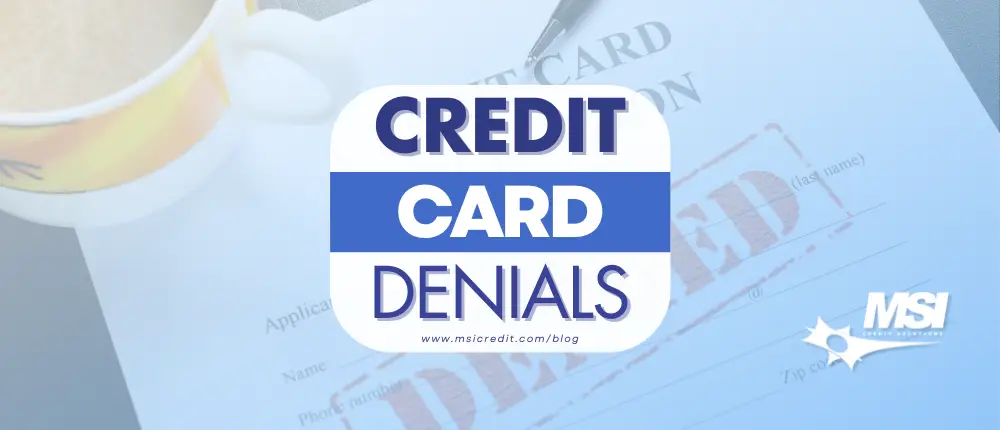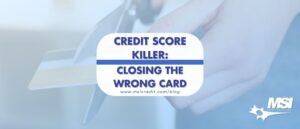If you’ve recently applied for a credit card and found yourself facing rejection, you’re not alone. Credit card denials are frustrating, but understanding the underlying reasons behind them can help you address the issue and improve your chances of approval in the future. At MSI Credit Solutions, we know that credit card denials can feel discouraging, but they also present an opportunity to learn and take steps toward better financial health.
1. Low Credit Score
- One of the most common reasons for a credit card denial is a low credit score. Lenders use your credit score to gauge your creditworthiness. A score that is too low may indicate to creditors that you are a high-risk borrower, which leads to them declining your application.
What to Do:
- Check your credit report: Before applying for a credit card, review your credit report for errors or outdated information. You can get a free credit report once a year from each of the three major credit bureaus (Equifax, Experian, and TransUnion).
- Work on improving your credit score: If your credit score is low, you may need to focus on building your credit history by paying down existing debt, making on-time payments, and reducing your credit utilization ratio (the amount of credit you’re using compared to your total credit limit).
2. High Debt-to-Income Ratio
- Your debt-to-income (DTI) ratio is another key factor in credit card applications. This ratio measures the proportion of your monthly income that goes toward paying off debt. A high DTI suggests that you may already be overwhelmed by debt and may struggle to take on more.
What to Do:
- Reduce existing debt: Focus on paying off high-interest debts, such as credit card balances, to lower your DTI.
- Increase your income: Consider ways to boost your income, whether through a side job, a raise, or reducing your living expenses.
3. Too Many Recent Credit Applications
- Lenders can be wary of applicants who have applied for multiple credit cards in a short period. Each credit card application typically results in a hard inquiry on your credit report, and too many hard inquiries in a short time can suggest that you’re taking on too much debt or are financially unstable.
What to Do:
- Space out your credit applications: Avoid applying for multiple credit cards in a short timeframe. If you’re planning to apply for credit, it’s a good idea to space out applications by several months to minimize the impact on your credit score.
- Consider prequalification: Some credit card issuers offer prequalification or pre-approval tools that allow you to check your eligibility without affecting your credit score.
4. Incomplete or Inaccurate Application Information
- Sometimes, credit card denials happen because the application itself is incomplete or contains errors. Missing information, a typo in your income, or an outdated address could be enough for a lender to reject your application.
What to Do:
- Double-check your application: Make sure all of your information is accurate and up to date. Pay close attention to details like your income, employment status, and credit history.
- Clarify any discrepancies: If there’s a potential issue with your application, take the time to address it directly with the credit card issuer.
5. Not Enough Credit History
If you’re new to credit or have a thin credit file, you might face difficulty getting approved for a credit card. Lenders rely on your credit history to assess your behavior as a borrower, and without enough data, they may be hesitant to offer you credit.
What to Do:
- Start with a secured credit card: A secured credit card is an excellent way for those with little or no credit history to begin building their credit. With a secured card, you deposit money as collateral, and your credit limit is typically based on that deposit.
- Become an authorized user: Another way to build your credit history is by becoming an authorized user on someone else’s account, such as a parent or spouse. This allows you to benefit from their positive credit history.
6. Recent Negative Events on Your Credit Report
Recent negative events, such as missed payments, charge-offs, bankruptcies, or collections, can hurt your chances of getting approved for a credit card. These events signal to lenders that you may not be financially responsible.
What to Do:
- Give it time: Negative marks on your credit report can take time to fade. While some events may stay on your report for several years, they have less impact on your credit score as time passes.
- Work with a credit counselor: If you’ve experienced a financial setback, a credit counselor can help you create a plan to manage your debt and improve your financial situation.
7. Limited Income or Employment History
Credit card issuers need to see that you have a reliable source of income to repay the debt. If your income is too low or if you’ve recently switched jobs, issuers may hesitate to approve your application, fearing you won’t be able to make payments.
What to Do:
- Provide accurate income information: If you have multiple streams of income, include them in your application. Lenders may also consider assets or savings when reviewing your ability to repay debt.
- Stabilize your employment: Lenders tend to prefer applicants who have been in their job for a while. If you’re in a transitional phase, consider waiting until you’ve been in your current job for a while before applying.
8. Too Much Existing Credit
If you have too much existing credit or too many open credit accounts, credit card issuers might be reluctant to extend additional credit. Lenders may see this as a sign that you’re already at risk of overextending yourself financially.
What to Do:
- Close unused accounts: If you have credit cards that you don’t use, consider closing them to reduce the total number of open accounts. However, do so cautiously—closing too many accounts at once can negatively impact your credit score.
- Manage your credit wisely: Even if you have multiple credit cards, be sure to use them responsibly. Keep your credit utilization low (ideally below 30%) and make payments on time.
9. Your Credit Card Choice Doesn’t Match Your Profile
Not all credit cards are created equal, and some cards may be more suited to people with certain credit profiles. For example, a rewards card or a premium credit card may not be the best fit for someone with a limited credit history or a low credit score. Applying for a card that’s too advanced for your profile could lead to a rejection.
What to Do:
- Research card options: Look for credit cards that are more in line with your credit history and financial situation. Secured cards or cards for people with fair or average credit may be a better starting point.
- Consider the issuer’s requirements: Every credit card issuer has different approval criteria. Some may be more lenient than others, so it’s worth researching which cards you’re more likely to be approved for.
Conclusion: Turning Denial into Opportunity
If you’ve been denied for a credit card, take a deep breath. It’s not the end of the road. Use this setback as a learning experience to understand what went wrong and what steps you can take to improve your credit situation. Whether it’s paying down debt, improving your credit score, or choosing the right type of card, the right strategy can help you turn things around and increase your chances of approval next time.
At MSI Credit Solutions, we’re here to help you navigate the credit landscape. Whether you need personalized advice, debt management tools, or help improving your credit score, we offer solutions that can guide you toward better financial health. Remember: building good credit takes time, but with patience and the right guidance, you’ll get there!

Give us a call today for a free credit analysis and consultation!
(866) 217-9841

MSI Credit Solutions provides superior credit restoration and comprehensive consulting services that are reliable and affordable.
*The information in this article has been provided strictly for educational purposes.





